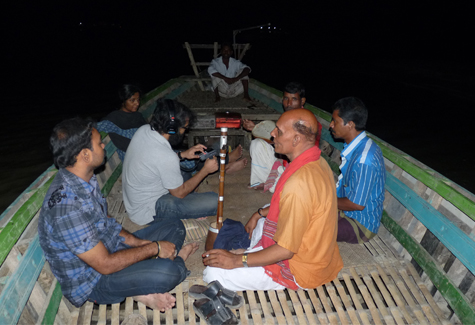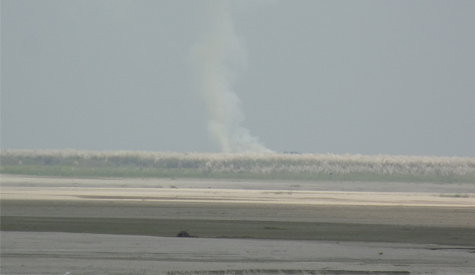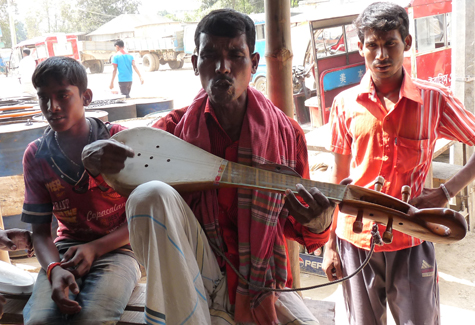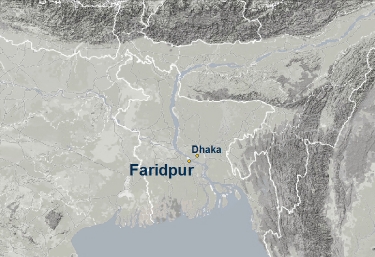On River Padma, Faridpur, Bangladesh. 21 October 2011. Fakir Ajmal Shah and Emtaj
shubho sadhu sango
matir gachhe lau dhorechhe
Once again we were in Faridpur. We keep going back to this small town in the West of Bangladesh, ‘closer’ to us than most of the other places where we go. We feel drawn to it; in Bangla we would put it like this: জায়গাটার কী যেন একটা টান আছে। Perhaps because we have very close friends here—Salamat Khan, Sanjay Shikdar, also friends of friends; some singers we keep recording—Habib, Ibrahim Boyati, Laila; often the same songs. We go to the same haunts—Shambhunath’s tea shop in the evening where Habib might appear and sing Anathero bondhu koruna sindhu song for yet another time; Sadi bhai’s shop where we will eat breakfast; then an evening of music in Sadek Ali’s courtyard, a special session of Jainuddin’s jari; or to the river. . .

Recording Fakir Ajmal Shah and Emtaj on a boat on the Padma
It takes us about half a day to go from Kolkata to Faridpur. These days, the way we do it is, we call Sanjay or Salamat bhai and tell them when we are likely to cross the border at Benapole. We reach Benapole, usually in a taxi, and now most of the people at the border check-post know us —immigration, customs, money changer; also some of the young men who work as porter-cum-border-crossing facilitators. It is from the latter that we learn that our friends have arrived to take us home. Salamat bhai or Sanjay or both, sometimes with some other friends, hire a car and come and once our two-nation formalities are over, the rituals of our ‘reunion’ begin. We stop for lunch at Joshor.
On each new visit, within this sameness of Faridpur, there are also signs of change. A new bill-board is selling dreams of apartment houses and the happiness contained therein; a Dutch-Bangla Bank ATM has cropped up on Mujib Sarak, another a few yards away; there are fewer cycle rickshaws on the roads because wobbly rechargeable battery-powered three-wheelers have taken their place; these new vehicles emit strange birdcalls from time to time. There are more head-scarves on the streets; a shiny gift shop with cards and roses ; Ibrahim Boyati has shaved off his moustache; Bidyut serves tea in his father, Shambhunath’s tea shop because Shambhu da’s diabetic sores are eating up his feet. Bidyut’s tea is reassuring. Reassuring like the songs still sung around here.
We had first met Salamat Khan in 2006 and it is through him we got to record singers like Binoy Nath and Habib. All these years Salamat bhai had been telling us about Ajmal–Fakir Ajmal Shah. He said we should to listen to him at some point. It was late evening on 21 October 2011 when Ajmal Shah came to meet us at Dhalar More on the bank of the Padma. First we drank tea; then Salamat bhai said it would be nice to go on a boat to a quiet place, to record. Such was the wish, to find quietness, but motorised boats and mobile phones make a hell of a lot of noise. Especially as these days our phones can also endlessly sing.

Char on the Padma
However, we went to Aat-trish Ghat , a little island on the river, a char. The Padma keeps changing course, Salamat bhai told us; where the river once was now we have charland. As it is, there is less water in all our rivers these days. In the fading light of the evening, anchored near the ghat, Fakir Ajmal Shah sang mostly compositions of Lalon, playing his ektara and dugi. Then when Emtaj played his dotara and sang, Ajmal Shah accompanied him on the dugi. In the background there were other voices; we hear them in the recording. We had met Emtaj earlier in the day at Dikrir Char in C&B Ghat. He was singing to a small audience gathered in a little shop. Salamat bhai invited him to the evening’s session. Emtaj and Ajmal sang in very different styles.

Emtaj singing in a tea shop at Dikrir Char, Faridpur
Ajmal Shah’s song reminded us of the late Binoy Nath, also the singing style of Khoda Baksh Shah, song who was his guru. His original home was in Sujanagar, Pabna, but Ajmal Shah had made this Faridpur-Kushtia region his home for four decades. Thus, his repertoire and style both carried the Khoda Baksh Shah-Mokshed Ali Shah stamp. For this session we have included a composition of Khoda Baksh Shah that Ajmal sang.
Emtaj does not carry the mark of any particular place or lineage. The song he sings here could well be from the Rarh (Birbhum, Barddhaman,Bankura) region of West Bengal. It has such a musical structure. This particular song, Amar matir gachhe lau dhoirachhe, is quite popular and has been sung by many artists and variously interpreted. Some of the song picturisations on youtube are indeed quite lewd. Yet, Emtaj’s singing has a mystical quality about it. He refers to the composer as Wahed. In fact, who the composer is or where he is from and whether he is dead or alive does not seem to matter to him. When asked at the end of the performance where the composer comes from, he says, Tangail maybe. It seems that all that is important for Emtaj is that he likes to sing this song; it inspires him.
Interestingly, the Wahed of Emtaj’s song was Sheikh Wahidur Rahaman of Biyanibazar in Sylhet, who died in 2012. The song was first recorded by Kangalini Sufia. So, perhaps the song moved out of its place of origin in its very first rendition when Sufia marked it with her own style, which in turn is marked by her location near Bangladesh’s western border with India, and by her multiple border crossings.
It is as if two opposed approaches to songs and singing are placed side by side in this session. For Ajmal, it is all about theme, composer and composition; about lineage and the rootedness of style. For Emtaj, his song has no fixed home. Which is why in our notes, we have left his song region box blank.
Written in 2014.
- Saptiguri, North Bengal. 27 November 2003. Nirmala Roy
- Bolpur, Birbhum. 25 November 2003. Nimai Chand Baul
- Kolkata. 4 September 2019. Purnadas on Nabani Das Baul
- Surma News Office, Quaker Street, East London. 27 February 2007. Ahmed Moyez
- Ambikapur, Faridpur, Bangladesh. 29 April 2006. Hajera Bibi
- Sylhet, Bangladesh. 22 April 2006. Chandrabati Roy Barman and Sushoma Das
- Sylhet, Bangladesh. 21 April 2006. Arkum Shah Mazar
- Sylhet, Bangladesh. 20-21 April 2006. Ruhi Thakur and others
- Jahajpur, Purulia. 27 February 2006. Naren Hansda and others
- Faridpur, Bangladesh. 24 January 2006. Binoy Nath
- Uttar Shobharampur, Faridpur, Bangladesh. 22 January 2006. Ibrahim Boyati
- Baotipara, Faridpur, Bangladesh. 21 January 2006. Kusumbala Mondal and others
- Kumar Nodi, Faridpur, Bangladesh. 21 January 2006. Idris Majhi and Sadek Ali
- Debicharan, Rangpur, Bangladesh 18 January 2006 Anurupa Roy & Mini Roy, Shopon Das
- Mahiganj, Rangpur, Bangladesh. 17 January 2006. Biswanath Mahanta & Digen Roy
- Chitarpur, Kotshila, Purulia. 28 November 2005. Musurabala
- Krishnai, Goalpara, Assam. 30 August 2005. Rahima Kolita
- Chandrapur,Cachar. 28 August 2005. Janmashtami
- Silchar, 25 August 2005, Barindra Das
- Kenduli,Birbhum. 14 January 2005. Fulmala Dasi
- Kenduli, Birbhum. 13 January 2005. Ashalata Mandal
- Shaspur, Birbhum. 8 January 2005. Golam Shah and sons Salam and Jamir
- Bhaddi, Purulia. 6 January 2005. Amulya Kumar, Hari Kumar
- Srimangal, Sylhet. 27 December 2004. Tea garden singers
- Sylhet, Bangladesh. 26 December 2004. Abdul Hamid
- Dhaka, Bangladesh. 24 December 2004. Ali Akbar
- Dhaka, Bangladesh. 23 December 2004. Monjila
- Changrabandha, Coochbehar. 16 December 2004. Abhay Roy
- Santiniketan, Birbhum 27 Nov 2004 Debdas Baul, Nandarani
- Tarapith, Birbhum. 14 October 2004. Kanai Das Baul


